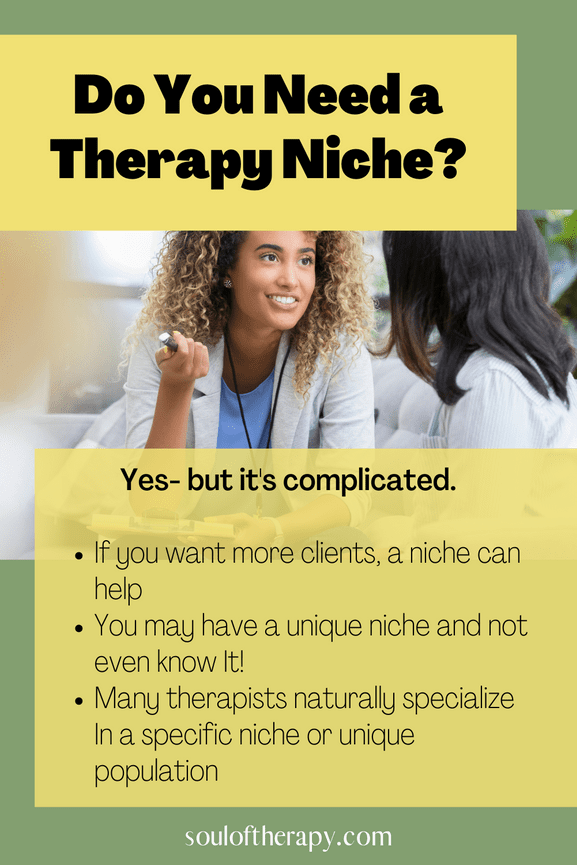How to Find Your Niche as a Therapist
I am asked two questions all the time. Do I need a niche? And how do you find your niche?
Whether you want to start your private practice or you're trying to attract more therapy clients, defining your niche can help distinguish you from all the other practitioners.
But how do you even start this process? This is one theme that consistently overwhelms mental health professionals. It can be so daunting that they stall their career together.
So, what if you're a brand-new therapist, and you don't have a lot of experience just yet? What if you don't necessarily practice one specific type of therapy?
Can you still list a specialty or have a niche? Let's get into everything you need to know.
Do You Need a Therapy Niche?
Yes- but it's complicated. If you want more clients, the answer is definitely yes.
The good news? Even if you don't have a defined niche, you probably have something. Many therapists work with a unique, different specialty than they even realize.
That's because you likely gravitate towards a "certain kind of client." Who is that client? What problems do they typically face? What kind of treatment do they benefit from? How does your work support their growth?
A niche is important because it allows you to narrow your focus. This is especially crucial when it comes to your marketing and onboarding efforts. Again, clients want to feel like you understand them. They want to know that you enjoy working with their types of problems.
The perfect niche opens the door for you to reach your target audience. This brings optimal clients to your practice.

How Do You Develop Your Niche?
Finding your niche isn't an overnight process. At first, many therapists struggle with this business question. They just want to help people! They don't want to have to sell their practice!
And yet, developing your niche is a gift to both you and your potential clients. By truly defining your services, you create a path towards building credibility in your work. You gain recognition among both professionals and clients alike. You no longer have to parse through clients who aren't a right fit for your practice.
Here are some tips for getting started!
Consider Your Current (Favorite) Clients
Who are you already working with? What specific group tends to gravitate towards your practice? If you work in an agency or are otherwise assigned clients, which ones have you been most interested to treat?
Stephanie Winfrey, LCSW, cites that she "accidentally" fell into her niche based on this advice. It was accidental, but I found that I am good with personality disorders. I started in community mental health, where they trained me in DBT...I also was on the drug and mental health court teams. From there, I worked in inpatient psych, which helped me better recognize the differences in diagnosis and how personality disorders play into things.
Lean Into Existing Passions
Just like you should consider your current favorite clients, you should also think about what an ideal private practice looks like to you. If I told you that you needed to secure 10 more therapy clients this week, which types of people would make you feel most enthused?
Consider starting with passion. That's the approach Jennifer Whang, LMFT, took. It was working with inner-city families that I discovered my niche in racial identity and its intersections with relationships and cultures. All my clients are BIPOC and we explore and discuss racial identity and cultural background.
Get Super Specific
That's great that you want to treat anxiety. So does literally every therapist on the planet.
So, let's think about what kind of anxiety you want to treat. Here are just some quick ideas to get your mental juices flowing:
-
College students managing school stress
-
New mothers struggling with postpartum anxiety
-
Children whose parents are getting divorced
-
Therapists who feel insecure about their practice
-
Men facing financial uncertainty
That's not to say you can only work with one specific idea or type of person. Niches can be fluid and flexible, and you may "branch out" based on the client. But it's still a really good idea to think about who your SUPER SPECIFIC client is.
Once you get that down, you can develop clear marketing copy and write dynamic content that speaks to your clients.
Executive director, Dr. Dowtin, states, I started with writing out the vision statement for my practice, what I saw for my work. Then I developed the mission statement- how are we planning to get there? Both of those were based on what I'm passionate about and where my skills were at the time, while including what skills I wanted to develop. as I'm bringing on clinicians now, I use the mission and vision to set the stage for what I want to see in applicants.
Consider What's In Demand
No, you shouldn't just follow the trends when it comes to therapy. However, you may benefit from seeing which other therapists have full waitlists. You might also benefit from seeing what kinds of clients repeatedly need support.
Think about it- if 100 therapists in your local area provide family therapy, you're going to need to be an AMAZING family therapist to stand out. You're also going to need to find clients who will see you as different from all the other private practice therapists providing similar services.
But let's take it a step further. Family therapy may be saturated, but what about working with military families? Or families with same-sex parents? Or newly-married couples who feel ambivalent about having children? These all represent specific niches that you may love treating in your own practice.
Trust That It Can Happen Organically
Sometimes your therapy practice niche comes to you unexpectedly. This happened to me! I never intended to work with new therapists, but my work in imposter syndrome and insecurity led me to that population.
I also became quite well-versed in substance use and eating disorders. Did I set out for that work? Not necessarily- it just so happened that those were the demographics I worked with in my first internships and job sites.
Other therapists have similar experiences with cultivating their interests.
Saira Malhotra, LCSW, has a niche primarily focused on investigating the relationship between systems and mental health. She states, I guess you could say I sort of fell into my niche after graduating in 2019, since the pandemic started shortly after, and systemic stressors were ramping up. The traditional modalities were incredibly individualistic- and while I found some components extremely helpful, I needed some different approaches to help my clients manage their way through such a horrific time.
Kelly Rodriguez, LMFT, PMH-C, works with perinatal mental health. I developed this niche after going through perinatal anxiety with my first baby 8 years ago. I was already a therapist, but I didn't know about perinatal mood and anxiety disorders until I went through it, especially as a woman of color. After having difficulty finding therapists specializing in this area, I decided to get trained and pursue certification.
Abbey Sangmeister, therapist and life coach, found that professionals or Type A personalities in kids and adults were finding their way to me, often as a result of anxiety, depression, and trauma. As we worked on those, I noticed they were all burned out! So I began teaching clients how to heal and prevent burnout.

Do You Need Training?
A therapy niche is not necessarily the same as therapy expertise. Expertise refers to having extensive knowledge and expert skills in a specific area of interest. This may certainly be your goal, but it's worth noting that takes time and practice to get there!
A niche refers to the types of people or problems you most prefer to treat. That is the most important thing- you are passionate and jazzed about this type of work.
So yes, training helps. Certifications, workshops, credentials- these will never hurt your practice. But keep in mind that someone else will always have more experience than you. That doesn't disregard your worth- many therapists still successfully work within their current scope even if they don't have the expertise yet.
Here are some tips I've sourced about training.
My first job out of grad school was at a residential treatment center for women...It was quickly evident to me how many of these women also suffered significant trauma. I started to get further training to help these clients resolve their trauma. This led to me focusing on trauma and trauma trainings in my private practice where I am now a Level 2 Certified Clinical Trauma Professional- Robyn Elizabeth, LPC.

What Happens After You (Sorta) Know Your Niche?
I say 'sorta' because if you're reading this, you still may feel uncertain. That's okay! You can still move forward with developing your practice.
Know Your Competition
This isn't a malicious thing! Having a niche helps you stand out, but there's a good chance you aren't the only therapist in the world treating that issue.
Stop thinking that you need to be the only one in your area understanding a specific issue. At some point, your waitlist will get full (a good problem to have), and you'll want to have other professionals to contact! This helps you build a solid referral list.
Brainstorm Your Marketing
Good marketing starts with having a focused approach. You now know your targeted client. Now imagine how they will look for a therapist.
Will they source Google? Look up therapists on Instagram or TikTok? Ask their primary care physician? These are all valid methods clients use to find therapists- you need to know which one your clients will likely use.
When it comes to optimizing your marketing, everything from web design to blog posts to business cards comes down to knowing your niche. In some ways, this resembles your 'therapy practice brand,' and I say that while trying to NOT sound slimy.
Keep Learning
This is where the fun happens in optimizing your private practice niche! If you want to truly specialize in something, you'll want to dedicate your efforts to learning as much about it as possible.
This is where the advice about seeking additional training and cultivating your interest more professionally comes in handy! Niches allow you to really hone in on what matters most to you.
Final Thoughts
Ultimately, people feel like you understand them when you speak their language and share their unique interests. And although it may sound paradoxical, if you don't have enough clients coming to your business, your reach might be too broad.
You can't work with everyone (and you shouldn't try). But by defining your niche, you increase the likelihood of working with the types of clients you most understand.


0 Comments